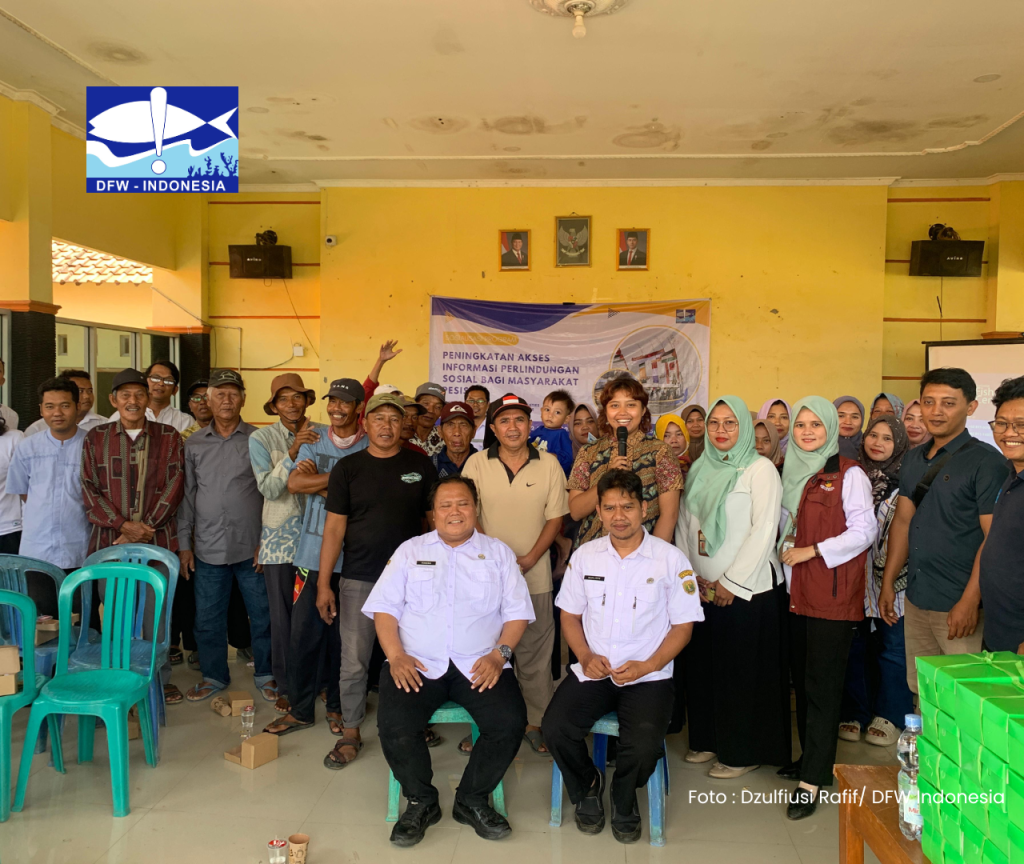Pekalongan, August 13, 2025 — Pekalongan Regency has become one of the most climate-vulnerable regions in Indonesia. As a coastal area located on soft alluvial soil, it is threatened by rising sea levels due to global warming, which causes tidal flooding and coastal erosion. The impacts of climate-related disasters have affected the fisheries sector — the main livelihood of coastal communities in Pekalongan — forcing many to change professions and become migrant workers in order to sustain their family incomes. Migrant fishery workers, particularly Fishing Vessel Crew (AKP), are highly vulnerable to exploitation through non-transparent recruitment processes, long working hours, minimal protection, unfair wages, and weak social protection guarantees.
In response to the social issues arising from climate change in the coastal areas of Pekalongan Regency, DFW Indonesia is implementing the PROSPER Program — Protecting Rural & Ocean-dependent Societies through Participatory Economic Resilience. The program aims to strengthen social protection systems and introduce alternative livelihoods for communities affected by climate change, especially Fishing Vessel Crew (AKP) and their families, small-scale fishers and aquaculture farmers, fish processing communities, and other impoverished coastal populations. PROSPER focuses on improving access to social protection systems and developing sustainable livelihood alternatives through community empowerment.
PROSPER is being carried out in Wonokerto District, Pekalongan Regency, Central Java, with three coastal villages as a pilot: Tratebang, Api-Api, and Pecakaran. These three areas are coastal regions impacted by climate change due to global warming. The consequences include rising sea levels, tidal flooding, coastal erosion, and risks of losing sources of livelihood. These villages also supply labor for the capture fisheries industry in various regions such as Muara Baru, Tegal, Juwana, Cilacap, Benoa, and others.
As an introduction to PROSPER, DFW Indonesia held a socialization event titled “Improving Access to Social Protection Information for Coastal Communities.” The event discussed the types of social protection programs, particularly those designed by local government bodies. Held at the village meeting hall, the PROSPER socialization event was attended by families of Fishing Vessel Crew (AKP), fishers, aquaculture farmers, other fisheries sector workers, the Pekalongan Regency Social Affairs Office, and the Marine and Fisheries Office. The event also served as an effort to build partnerships with local governments, the private sector, village-level stakeholders, and the community.
The government has implemented various social protection programs for the community in the form of social assistance and social insurance, distributed across various sectors but often operating independently. Therefore, PROSPER aims to build a collaborative and integrated system to provide access to information on social protection programs for coastal fisheries communities.
“The PROSPER Program develops an approach to integrate various social protection programs — whether managed by the government, private enterprises, or individuals — so that they can be more effective and better targeted to the community,” explained Nabiyya Perennia, PROSPER Program Coordinator, DFW Indonesia.
PROSPER has been well-received by the heads of the three pilot villages. Pronisa, the Head of Tratebang Village, hopes PROSPER can help the community access proper social protection. Similar appreciation was expressed by Abdul Muis, Secretary of Pecakaran Village, who said that PROSPER could help bridge the information gap in social protection access that villagers have long faced.
Regarding access to social protection, Qomarudin, Head of Api-Api Village, emphasized that the village government has proposed names of eligible residents for social protection programs. However, he stated that currently, village heads only serve as implementers at the grassroots level. According to him, the decisions made after field verification by the Ministry of Social Affairs often do not align with the data proposed during the village development planning meetings (Musdes).
Responding to this, Muhlisinalahudin, a representative from the Pekalongan Regency Social Affairs Office, said that local data has been verified by the Central Government. The Central Government, through the National Socio-Economic Integrated Data (DT-SEN), has verified the data collected by the Ministry of Social Affairs and other ministries. In addition to this, the system is integrated with other public services such as PLN (utilities) and Pertamina (fuel)/
“This process is conducted to ensure that the distribution of social assistance and guarantees provided by the state is not overlapping and is accurately targeted,” he explained.
In addition to the mismatch between government data and village proposals, Musnafik, a family member of an AKP, highlighted the issue of insurance for AKP provided by the government. According to him, there is still a lack of clarity on social protection for AKP who work at sea for months — sometimes up to twelve months.
Fahrudin, Head of the Aquaculture Division of the Pekalongan Regency Marine and Fisheries Office, stated that social protection efforts for fishers are being carried out through the provision of fisher insurance via the Workers Social Security Agency (BPJS Ketenagakerjaan) with a premium of Rp 38,000 per month.
“With this social insurance, it can help reduce the vulnerability risks faced by fishers while working at sea,” said Fahrudin.










